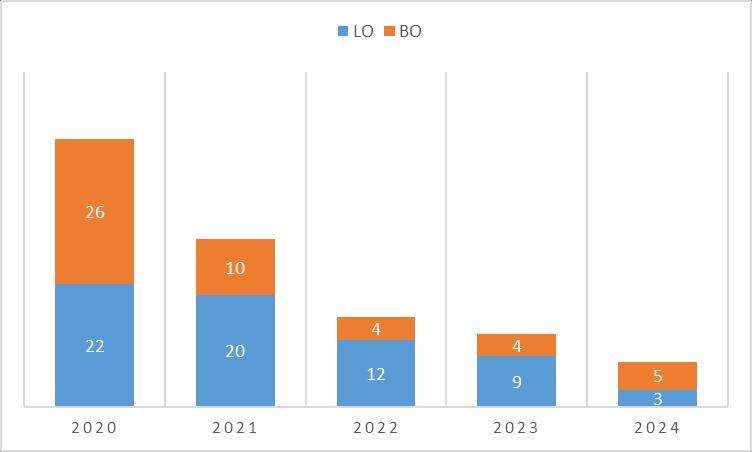




OCTOBER 22, 2024

1. Statistics
2. Market Penetration
3. Entry routes for Foreign Entity in India
4. Comparative Analysis
5. Tax Implications
6. Regulatory Compliance and Reporting's
7. Case Studies



* Source: RBI
- Foreign Associate Companies- if non-resident investor owns at least 10% and no more than 50% of the voting power/equity capital
- Foreign Subsidiary Companies- if a non-resident investor owns more than 50 per cent of the voting power / equity capital.



Construction
Electricity, gas, steam and air conditioning supply
Agriculture-related, Plantations and Allied activities
Mining Water supply; sewerage, waste management and remediation activities
* Source: RBI


Market Analysis & Expansion
• Market Mapping, Market Sizing
• Competitive Analysis
• Regulatory Overview
• Feasibility Study of Setting up India Business
• Opportunity to increase sales or expand their business
JV & Partnership
• Strategic Investment and partnership.
• Identification of JV Partners and Strategic Alliances
• Identification of Acquisition Targets
Channel Partners & Policy Reforms
• Identification of Potential Vendors
• Channel Study and Identification Channel partners
• Various government incentives to attract foreign Investment.
Site Analysis & Talent Pool
• Manufacturing Site Analysis
• Human Resource Study including Costs, Benchmarking, Availability, sourcing
• Talent Search and Team Building






Particulars
Commencement of Business/ Operations
Legal Status
Pvt Co is a separate legal entity registered under Companies Act, 2013. The Directors are liable for defaults made under the act
Public Co is a separate legal entity registered under Companies Act, 2013. The Directors are liable for defaults made under the act
OPC is a separate legal entity registered under Companies Act, 2013. The Directors are liable for defaults made under the act
LLP is a separate legal entity registered under LLP Act, 2008. The Designated partners of LLP are liable for contraventions under the act


Liaison Office
• Act as channel of communication between the Parent and Indian Company
• Promote Business and Product awareness
• Facilitate technical or financial collaboration
• Conduct Market research and gather information on Indian Markets
• Representing Parent company in India to handle Public relations.
Branch Office
• Conduct business operations and generate Income within India.
• Acts as extension of Parent company, providing the same products and services as the Parent company.
Project Office
• Execute and manage specific projects in India
• Typically set up for a limited period and is linked to the completion of a particular project.
• Bring expertise and skills for project implementation.

Liaison Office (LO)
Permitted activities Represent parent company in India
Promote export/import from/to India
Branch Office (BO)
Export/import of goods
Rendering professional or consultancy services
Project Office (PO) WOS/ JV LLP
PO can be set up to execute specific projects in India
Facilitate technical/financial collaboration between parent company and companies in India. It cannot earn any income in India
Acting as buying/selling agents for the parent company in India
Rendering services in IT and development of software in India
Rendering technical support to the products supplied by the parent/ group companies
Permission for establishing BO in the Special Economic Zones (SEZs)
Render service during the warranty period and after sale service as per Contract terms. It can carry out commercial activities/ execute a contract only to the extent required for the period.
All types of business activities are permitted, such as in the manufacturing, marketing, services sectors.

The LLP’s structure and objective are primarily suited for carrying out business activities related to the services sector.

Liaison Office (LO)
Eligibility
• Profit making track record during the immediately preceding 3 F.Y in the home country
• Net worth of not less than USD 50,000 or its equivalent.
• Profit making track record during the immediately preceding 5 F.Y in the home country
• Net worth of not less than USD 100,000 or its equivalent
There is no minimum capital required for incorporating a private limited company
capital requirement conditions

Validity
Generally for 3 years* except in the case of NBFCs and those entities engaged in construction and development sectors, for whom the validity period is 2 years only
As per the tenure of the project
A company, once incorporated, will continue until its dissolution
An LLP once incorporated continues till it is dissolved or as per terms stated in the LLP agreement


Particulars Liaison Office (LO) Branch Office (BO) Project Office (PO) WOS/ JV LLP
Prior Approval RBI approval before commencement of any operations. RBI approval before commencement of any operations. RBI approval before commencement of any operations. Automatic or Government route FDI is permitted under the




Investment in India has improved considerably since the opening up of the economy in 1991.
This is largely attributed to ease in FDI norms across sectors of the economy. India, today is a part of top 100 club on Ease of

Doing Business (EoDB) and globally ranks 1st in the greenfield FDI ranking. India received the record FDI of $ 60.1 bn in 2016-17.






FDI permitted through Automatic route 100% FDI permitted through Government route
•Note:


Upto100% FDI permitted through Government + Automatic route Upto 51% FDI permitted through Government/ Automatic route
i) In sectors/ activities not listed above, FDI is permitted up to 100% on the automatic route, subject to applicable laws/regulations;
and other conditions.

No prior approval from the Government of India is required.
Available for most sectors, except those specifically restricted.
Limits : Sectoral caps/ stipulated sector specific guidelines.
Investors only need to inform the Reserve Bank of India (RBI) within 30 days of investment.
Faster process since it bypasses government scrutiny.

Prior approval from the Government of India is mandatory.
Only for cases other than Automatic Route and those mentioned in sectoral policy.
Investors must obtain permission from the concerned ministry or department before investing.
An entity of a country, sharing land border with India or where the beneficial owner of an investment into India is situated in or is a citizen of any such country (Pakistan)

AUTOMATIC ROUTE (Illustrative)
Mining
IT
Financial services(a)
Construction Development
Infrastructure
Manufacturing sector
Note: (a) Sector specific guidelines
(b) Subject to certain exceptions

GOVERNMENT ROUTE (Illustrative)
Titanium (Mining) 100%
Broadcasting (Content) 46%
Banking for Public 20%
Print 26%
Insurance (a) 70%
Agriculture (b)
Atomic energy Lottery, betting and gambling Chit fund, Nidhi company
Trading in Transferable Development Rights
Cigars & Cigarettes NEGATIVE LIST (Illustrative)

Wholly Owned Subsidiary
►Wholly Owned Subsidiary (WOS) can be set up in sectors where 100% foreign direct investment is permitted under the FDI policy. It can be set up by the Foreign Companies only.

►It operates as an independent legal entity whose 100 percent equity shares are owned by another company, the parent company.
►It can be in form of private company or public company
►It carries out the business activities as a separate legal entity however controlling interest vest with the foreign parent Company.
►Profits can be taken out of India, net of Indian taxes, in the form of dividend.
►The WOS will be subjected to Indian taxes and laws as applicable to other domestic companies

►A joint venture is a partnership between two or more companies or individuals who agree to pool capital or goods to run a business or to achieve a commercial objective

►It can be in the form of companies, partnerships or joint working agreements/ strategic alliances.
►Foreign Companies set up Joint ventures in India in sectors where 100 percent FDI is not permitted
►JV helps foreign companies to utilize the existing networks of their Indian partners, and once taxed, such companies can remit their Indian profits outside the country.
►Corporate JVs will also be subject to the country’s tax laws, FEMA, labor laws, the Competition Act of 2002, and various industry-specific laws.

►LLP Firms are partnership firms with limited liability of partners. It is a combination of partnership and a Company

►100% Foreign Direct Investment in LLP is allowed for the sectors/activities where 100% FDI is allowed under the automatic route and there are no FDI- linked performance conditions.
►LLPs can also make downstream investment in another company or LLP in sectors where 100% FDI is allowed under automatic route.
►FDI in an LLP under the automatic route is subject to the following conditions:
• The LLP should come under a sector that has no FDI-linked performance conditions, which refers to sector specific conditions for companies receiving foreign investment;
• The LLP should be in a sector that permits 100 percent FDI; and
• The conditions of the LLP Act of 2008 and rules thereunder are met

Notes
Lottery Business including Government/private lottery, online lotteries , etc.* Gambling and Betting including casinos*
Chit funds
Trading in Transferable Development Rights (TDR)
Real Estate Business or Construction of farm houses**
Manufacturing of cigars, cheroots, cigarillos and cigarettes, of tobacco or of tobacco substitutes
Sectors not open to private sector investment- atomic energy, railway operations (other than permitted activities mentioned under the Consolidated FDI policy)
*Foreign technology collaboration in any form including licensing for franchise, trademark, brand name, management contract is also prohibited for Lottery Business and Gambling and Betting activities
**Real estate business shall not include development of town shops, construction of residential/ commercial premises, roads or bridges and Real Estate Investment Trusts (REITs) registered and regulated under the SEBI (REITs) Regulations, 2014


Key Features of India’s taxation System: Taxes in India are levied by the Central Government and the State Governments. Some minor taxes are also levied by the local authorities such as the Municipality and Local Government.

Major Central Taxes Major State Taxes
►Income Tax
►Central Goods & Services Tax (CGST)
►Integrated GST (IGST)
►Custom Duty
►State Goods & Services Tax (SGST)
►Stamp Duty & Registration
A resident company is taxed on its worldwide income. A non-resident company is taxed only on income that is received in India, or that accrues or arises, or is deemed to accrue or arise, in India.
Company whether Indian or foreign is liable to taxation, under the Income Tax Act,1961. Corporation tax is a tax which is levied on the incomes of registered companies and corporations.. Taxes In India are primarily into 2 categories- Direct and Indirect Tax.

Facts of the case:
• An Foreign Company “XYZ Ltd” into Pharma Industry wanted to acquire Delhi based Partnership firm via Equity Capital.
• Delhi based firm was into manufacturing of Daily Home care essentials.
Questions:
• Is this transaction allowed under FEMA?
• Can NR invest in Partnership firm?












https://taxmann.com/
